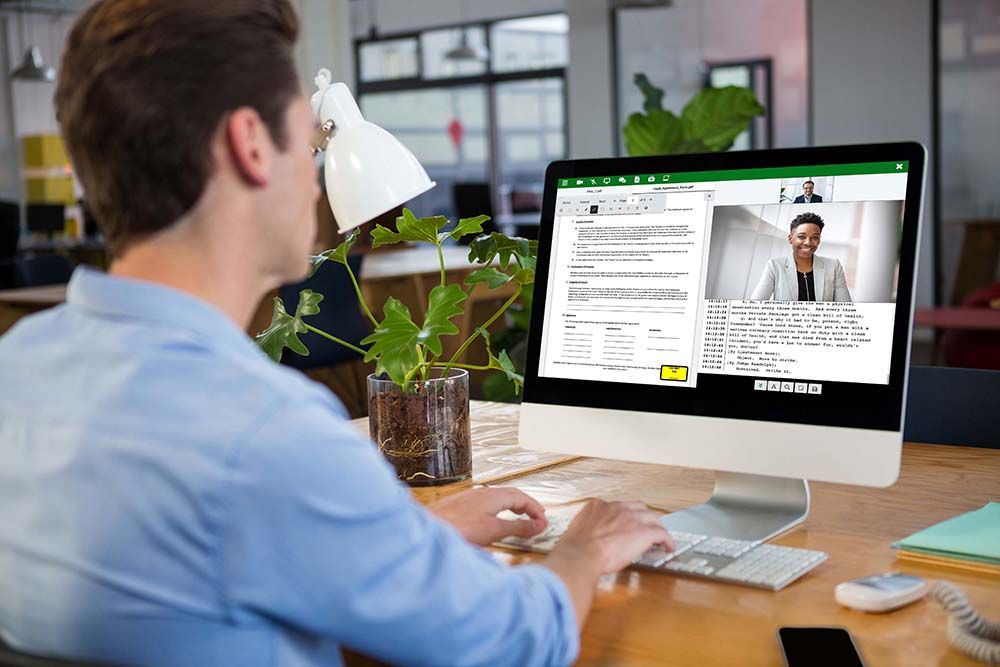The Future of Legal Procedures: Remote Depositions Explained
The Future of Legal Procedures: Remote Depositions Explained
Blog Article
Browsing the Future of Legal Process With Seamless Remote Depositions Solutions
The landscape of lawful process is quickly advancing, with remote depositions becoming a noticeable function in this improvement. As innovation remains to advance, the assimilation of smooth remedies for remote depositions has become important for attorneys seeking reliable and economical methods to carry out depositions. Nonetheless, the course to totally welcoming this shift is not without its challenges and considerations. By checking out the details of browsing the future of legal process with smooth remote deposition options, a clearer understanding of the possibilities and complexities that lie in advance can be gotten.
The Surge of Remote Depositions
With the arrival of sophisticated online communication technologies, the technique of remote depositions has experienced a substantial surge recently. This change has been mostly driven by the need for adaptability, efficiency, and cost-effectiveness in lawful process. Remote depositions allow lawyers, witnesses, and stenotype reporter to participate from different locations, getting rid of the need for physical presence in a specific deposition room. The ability to carry out depositions from another location has proven important, particularly in circumstances where travel or in-person gatherings are impractical or limited.
Additionally, the innovations in video conferencing systems and digital tools have boosted the overall experience of remote depositions, guaranteeing clear audio-visual communication and safe documents of testaments. Lawyers currently have the alternative to effortlessly arrange, document, and record depositions effortlessly, streamlining the entire process.
As modern technology remains to advance, remote depositions are expected to end up being even much more common in the lawful sector, using a practical and efficient remedy for carrying out depositions in a fast-paced and interconnected globe. (REMOTE DEPOSITIONS)
Benefits of Seamless Technology Assimilation
Just how does smooth modern technology assimilation enhance the performance and efficiency of remote depositions in the legal market? Seamless innovation integration plays an essential duty in streamlining remote depositions, supplying a myriad of advantages to lawful experts. By flawlessly integrating innovation into the deposition process, lawyers can perform depositions with convenience, despite the participants' physical locations. This combination enables real-time communication, document sharing, and partnership, cultivating a more efficient and effective deposition experience.
In addition, smooth innovation assimilation allows protected and reputable information transmission, making sure that delicate information shared during depositions is safeguarded. Advanced features such as virtual displays, electronic signatures, and video conferencing improve the total performance of remote depositions, mimicking the in-person experience with included comfort. In addition, the combination of transcription services and AI-powered devices can better improve the deposition procedure, conserving time and decreasing the margin of mistake.

Conquering Obstacles in Virtual Proceedings
To successfully browse online procedures, legal specialists must attend to and conquer numerous challenges that develop in the digital atmosphere. Among the main challenges encountered in digital proceedings is making sure secure communication and information security. With delicate info being shared online, preserving customer confidentiality and preventing information violations is critical. In addition, technological difficulties such as poor net link or audio/video issues can interfere with the flow of process and influence the top quality of interactions in between participants. Legal specialists have to also adapt continue reading this to the lack of physical presence, which can hinder non-verbal hints and communication subtleties crucial in lawful contexts. Additionally, preserving involvement and emphasis in digital setups can be testing for both lawful teams and witnesses, potentially impacting the effectiveness of the process. To alleviate these challenges, lawyers must buy reputable innovation, establish clear procedures for digital procedures, provide training on virtual etiquette, and make certain backup strategies remain in weblink location to address technical problems without delay. By proactively dealing with these difficulties, attorneys can enhance the performance and effectiveness of digital proceedings.
Ensuring Protection and Conformity Measures
In the world of legal process, guarding safety and security and making sure conformity procedures is of paramount significance for maintaining trust fund and upholding the stability of the procedure. With the shift towards remote depositions, making sure the protection and discretion of sensitive info traded throughout these process is critical. To accomplish this, attorneys must utilize secure on-line platforms that offer end-to-end encryption, protected access controls, and compliance with sector policies such as HIPAA and GDPR.

Future Trends in Legal Tech Integration
As the lawful landscape continues to evolve with remote deposition solutions stressing security and compliance, the assimilation of advanced lawful technologies is poised to form future patterns in the legal industry. One famous trend that is acquiring grip is the usage of expert system (AI) and artificial intelligence in lawful technology. AI-powered tools can help in lawful research study, contract analysis, and even predicting situation outcomes based upon historic data. This assimilation improves processes, lowers human error, and improves decision-making abilities.
Moreover, cloud-based services are becoming increasingly popular in the legal industry. Cloud modern technology uses improved adaptability, scalability, and accessibility, allowing legal experts to function collaboratively from anywhere with an internet link. This trend not just boosts efficiency yet also advertises cost-effectiveness by reducing the demand for physical infrastructure and upkeep.
In addition, blockchain innovation is making its way into legal tech combination, providing protected and clear methods to manage sensitive information, simplify deals, and validate the credibility of lawful papers. By embracing these future fads in lawful technology combination, regulation firms can stay ahead of the curve, enhance client services, and adjust to the altering demands of the market.
Conclusion
In final thought, the assimilation of smooth remote deposition solutions has revolutionized lawful procedures by supplying many benefits such as raised performance, cost-effectiveness, and access. Despite dealing with difficulties in online process, developments in technology continue to deal with safety and conformity problems (REMOTE DEPOSITIONS). As the legal sector welcomes more assimilation of modern technology, future fads direct towards an extra streamlined and efficient lawful process
Report this page